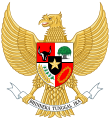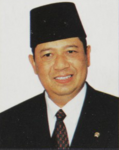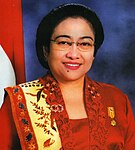
Back انتخابات الرئاسة الإندونيسية 2004 Arabic Elecciones presidenciales de Indonesia de 2004 Spanish Élection présidentielle indonésienne de 2004 French Pemilihan umum Presiden Indonesia 2004 ID Elezioni presidenziali in Indonesia del 2004 Italian Pilihan umum présidhèn Indonésia 2004 JV 2004년 인도네시아 대통령 선거 Korean Indonesische presidentsverkiezingen 2004 Dutch Wybory prezydenckie w Indonezji w 2004 roku Polish Президентские выборы в Индонезии (2004) Russian
| ||||||||||||||||||||||
| Registered | 155,048,803 | |||||||||||||||||||||
|---|---|---|---|---|---|---|---|---|---|---|---|---|---|---|---|---|---|---|---|---|---|---|
| Turnout |
| |||||||||||||||||||||
| ||||||||||||||||||||||
| ||||||||||||||||||||||
| This article is part of a series on the |
| Politics of Indonesia |
|---|
 |
Presidential elections were held in Indonesia on 5 July and 20 September 2004. As no candidate won a majority in the first round, a runoff was held, in which Susilo Bambang Yudhoyono defeated Megawati Sukarnoputri and was elected president. They were the first direct presidential elections in the history of Indonesia; prior to a 2002 amendment to the Constitution of Indonesia, both the president and vice president had been elected by the People's Consultative Assembly (MPR).
Under the new amendment, a candidate pair is elected into office after receiving more than 50% of the vote nationally with at least 20% of the vote in more than half of the provinces of Indonesia. If no pair receives the number of votes required, the election will continue into the second round with the pairs receiving the highest and second-highest number of votes. Further regulations set by the General Elections Commission (KPU) state that each pair must be nominated by a political party or coalition of parties which received at least 5% of the popular vote or 3% of the seats to the People's Representative Council (DPR) in the April legislative election.
The incumbent, Megawati Sukarnoputri, rose to the presidency following the impeachment of her predecessor, Abdurrahman Wahid, from office. Megawati's bid for election was challenged by four candidates, including incumbent vice president Hamzah Haz. In the first round, former cabinet member and retired general Susilo Bambang Yudhoyono received a plurality of the valid ballots submitted, followed by Megawati. Yudhoyono eventually defeated Megawati with 60.62% of the valid ballots in the second round. He was inaugurated as the sixth president of Indonesia on 20 October 2004.



